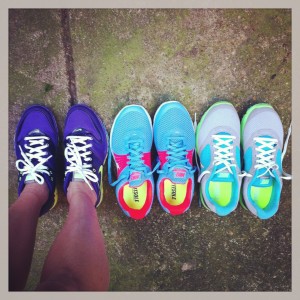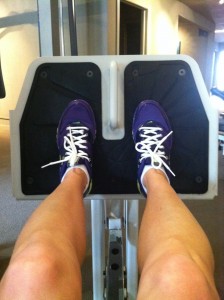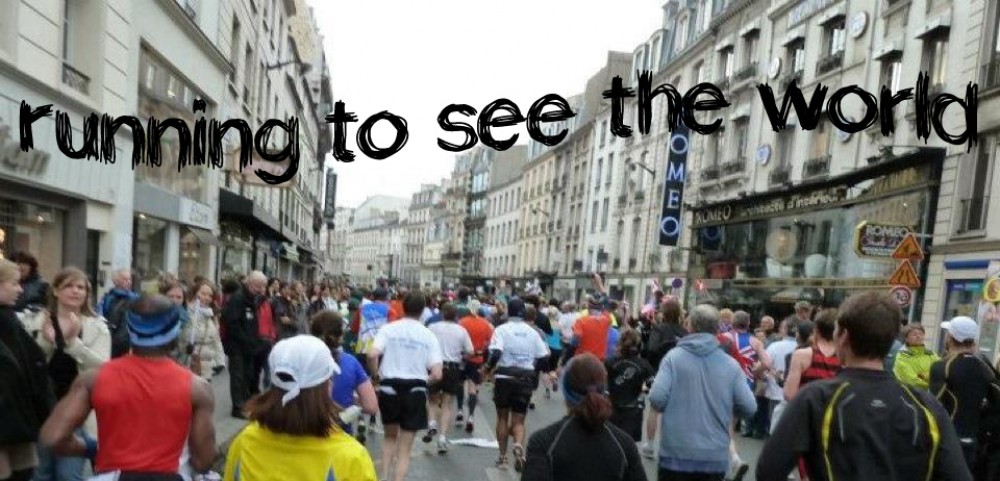While I am no expert, I have gained some knowledge about running (better) from my running partners and running buddies, reading articles and blogs, and from doctors and physical therapists. I also do what I feel is best for my body. Everyone’s body is different and can handle different pains, more or less rest, more or less food and water, etc.
Here you will find my random tidbits of information about training better, recovering better, and just feeling good. I will also blog here and there about my training, so keep an eye out.
People ask me what are the top three things a runner needs if they are training for a half marathon or marathon. My answer: good shoes, Body Glide, and a foam roller!
Since qualifying and running the Boston Marathon, I started to take my running a little more seriously. I am no elite runner, but some may say I’m fast. I am fairly modest about this. The year I ran Boston, 2011, I also ended up with a Talus bone injury later in the year. I had trained hard that year, so it could have been an overuse or overtrained injury or just simply stepped on a curb wrong during a run. It was about one month before I was to run the California International Marathon in my hometown. I was referred to a physical therapist that a couple of my friends had been to. It turned out the Talus bone was dislocated and he popped it back in with more PT visits to follow. www.theironthumb.com
My physical therapist has taught me a lot too. Rest, hydration and recovery are all really important things, especially if you want to continue running for a long time. Until I started going to him, I didn’t really follow any recovery plans after a race. But it is very important. He is a huge proponent of ice baths (I hate these!). So, even though I thoroughly enjoy drinking beers after a race, I try to remember to hydrate and do a lot of stretching after as well as the days to follow.
What’s also really nice is when you are traveling out of town for a race, if you stay a couple days after to explore the city you are in, you will do a lot of walking. Walking helps those post-race legs a lot!
Rest – Listen to your body. If you feel tired, it’s ok to take a day off. If something’s hurting, even a tiny bit, take a day off. If you are injured, take time off! It’s not going to kill you and your body will thank you. If you don’t rest, you will eventually get injuries or your injuries will take much longer to heal.
Hydrating – Well, I am not the best at drinking water on a daily basis, but I do try to drink fluids as often as I remember. Haha! I ALWAYS have water or an electrolyte (I use Gatorade or Powerade) when I run. And the days leading up to a race and race morning, I try to drink extra water and electrolytes. Beer is not water, but it sure tastes good! I’m not going to deny that I may have a beer or two the week of a race, but I do not drink alcohol the night before.
Recovery – Foam rollers are amazing! Get one if you don’t have one. I would recommend getting a smaller one as it’s easier to use in your house and you can travel with it. Stretching is great too. Whether you like yoga, pilates, or traditional stretches, do it as often as possible. If you stretch and use your foam rollers consistently for injury prevention, you will feel a lot better after a race. Also, ice baths are very good as well as additional icing in specific spots after long training runs or races.
Cross training/weight training – While I have always been active and incorporated weight training into my daily routine for many years, I have realized (and read) that runners especially need the cross training and weight training to keep their bodies in tip top shape and it also helps with your endurance. Even though you may think your body is strong from all the running you do, that’s not necessarily true. I have had to work on some weaker parts of my body recently to keep from getting injuries. You also want to work on your core, which is a major component and very important to keeping your form strong.
Training plan – I went from half marathons to marathons, so I had a good base to start with when it comes to training. My running pal, Brian, has also created our training plans for each marathon and they are great to follow. The key is the mileage. You need to get the mileage in and build all the way up to a 20-22 mile run at the peak of your training before the race. This is about 3 weeks before the race and then you start to taper after. I don’t worry so much if I miss a short run here or there, but I get anxious if I miss a long run. These are important.
Good shoes - Having a pair of running shoes that fit properly are highly recommended. You can get fitted at a local running store if you prefer, or you can read reviews of shoes online to find the best fit. Try them on and make sure they are comfortable. I’m a Nike wearer and have been for many years. They have always worked for me. But there are many other really great brands of long distance running shoes. I usually wear a brand new pair as I start training for the next race. You really only want to wear them for about 300 miles or so. All the miles add up and break down the shoe, so after a while this could cause injury if you run in worn out shoes.
http://running.about.com/od/shoesapparelandgear/f/replaceshoes.htm
Cryotherapy – I decided to try this form of cold-air treatment after the LA Marathon to see if I could see a difference in my recovery. I have been wanting to try it for a while. You go into a chamber that is -180 degrees for two and a half minutes. It’s pretty darn cold, but a much shorter time than an ice bath and the times goes by fairly quickly. My body temperature was 95 degrees before I entered the chamber and was 45 degrees when I came out! I then got on a treadmill to warm up. I was shivering after exiting the chamber but it took under 10 minutes to get warmed up again. I feel like it may have helped with my recovery. I felt less sore and better on day two after the race. I will try this again after my longer runs coming up, so I will keep you all updated. www.uscryotherapy.com
You can read more about what pro-athletes think -
http://www.npr.org/2011/10/15/141336088/cryotherapy-why-pro-athletes-like-it-chilly
Need help with your training? Have questions?
I can help train virtually or if you are local, I would love to help you get out the door! So let me know if you have any questions or need help. This running thing is kinda fun. Email me at info@runningtoseetheworld.com.

Thanks for the types, Deb Trotti who I went to high school with at Del Campo sent me ur website. Awesome, keep it going as long as you can.
Thanks Norman!